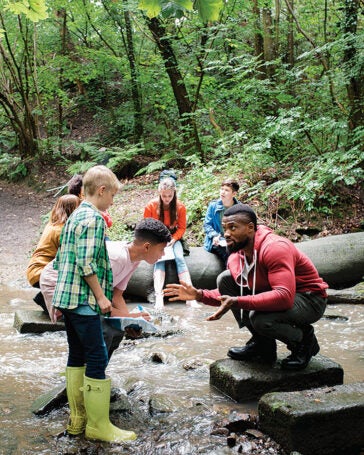In Brief
Nanoparticles Target Hard-to-Treat Liver Disease
Nearly 30 percent of cases of hepatocellular carcinoma, the fastest-growing cause of cancer-related death in the world, have been attributed to chronic alcohol liver disease. Heavy alcohol consumption leads to fatty liver, hepatitis, and eventually cirrhosis, increasing cancer risk. But treatments for alcohol liver disease and associated fibrosis have proven largely unsuccessful due, in part, to the difficulty of targeting therapies to specific liver cells.
Associate Professor Jyothi Menon (biomedical and pharmaceutical sciences and chemical engineering) is researching the use of nanoparticles as a carrier system to deliver anti-fibrotic and anti-cancer therapies to the liver. Menon received grants from the National Institutes of Health’s National Cancer Institute and the Biden Cancer Moonshot, a program “to support early-career researchers and help build a cancer research workforce that better represents the diversity of America.”
URI School of Education Is Now the College of Education

URI’s former School of Education is now the Alan Shawn Feinstein College of Education. The college will expand programs for students and professionals, offer new degree programs, and continue a three-year trend of graduating the most teacher candidates in Rhode Island. The college’s new degree offerings include a Bachelor of Science in environmental education, to give students immersive, hands-on learning experiences to lead a new generation to a more sustainable future, while exploring the interconnectivity of the world.
“Our children deserve the best equipped educators that we can provide. There’s such a joy to that hard work because when you watch children learn and grow, you are participating in the trajectory of the rest of their lives,” said Danielle Dennis, dean of the college.
Study Seeks Insights to Help Understand, Treat, and Prevent Dementia
Professor William Van Nostrand (biomedical and pharmaceutical sciences and neuroscience), co-executive director of the George & Anne Ryan Institute for Neuroscience, is part of a team awarded a five-year, $8 million grant from the Leducq Foundation. The international team will study brain clearance—the brain’s process for flushing out toxins and harmful waste—as a contributor to cerebral amyloid angiopathy, a disorder that causes brain bleeds and commonly occurs with Alzheimer’s disease.
“I believe this collaboration will lead to important breakthroughs … and reveal key insights as to why cerebral amyloid angiopathy and other dementias occur and how we can treat and prevent them,” said Van Nostrand, who has studied cerebral amyloid angiopathy for nearly 30 years and recently co-authored key findings on the role of brain clearance in the disorder with investigators at Yale University.
URI Board of Trustees Welcomes New Members
URI’s Board of Trustees welcomed eight new members in spring 2023. Among them is former U.S. Congressman Robert A. Weygand, a former vice president and chief financial officer at URI. Additional new voting members are Maria Ducharme, president of The Miriam Hospital; Joseph G. Formicola Jr., developer and co-owner of the Coast Guard House restaurant; Monica Garnes, a division president in the Kroger Family of Companies supermarket chain; and Joseph F. Matthews, president of a 111-year-old Westerly machinery manufacturer.
Revaa Goyal, a junior pharmacy major, and Melissa Sutherland, professor of nursing, join the board as nonvoting members, and Michael Grey, chair of the Rhode Island Board of Education, joins as an ex officio member.
Get more news at uri.edu/news
Milestones
Happy Birthday to the College of Arts and Sciences!
URI’s College of Arts and Sciences celebrates 75 years of putting knowledge into practice. Founded in 1948, it is URI’s largest college, with more than 4,000 students in its 58 undergraduate and graduate degree programs.
News Ticker
OFFSHORE WIND IMPACTS
NOAA’s Northeast Fisheries Science Center and URI signed a five-year partnership to research how offshore wind energy development will affect marine ecosystems and the people who live near, or work on, the ocean.
RECOGNITION FOR WATERSHED WATCH
URI’s Watershed Watch program received the 2023 National Water Quality Monitoring Council’s Vision Award, recognizing its long contributions to improving local water quality.
TOP GRADE FOR URI TEACHER PREP
The National Council on Teacher Quality gave URI undergraduate and graduate teaching preparation programs an “A” for their rigorous reading instruction program. Nationally, only 23 percent of programs earned the top grade.
PLASTICS POLLUTION FORUM
Scientists, policymakers, advocates, and business leaders from the European Union, Canada, France, Ghana, and the U.S. participated in a two-day Global Plastics Forum at URI in May. Focused on the growing problem of plastics pollution, the forum is part of URI’s Plastics: Land to Sea research initiative.
PARTNERSHIP BACKS AUKUS PACT
URI and Flinders University formalized a research and education partnership that advances the AUKUS security pact signed by the U.S., Australia, and the U.K. The agreement bolsters Australia’s efforts to produce skilled workers needed to build up the country’s undersea capability through the acquisition of conventionally armed, nuclear-powered submarines.
Media Spotlight
You Can Quote Me
On the premise behind LK-99, a possible superconductor material that scientists in South Korea say they have devised:
“The holy grail would be to get something that was superconducting at room temperature.”
—Leonard Kahn, URI professor of physics
Business Insider
On the difficulty of accurately assessing the prevalence of child labor:
“Child labor is hard to measure, and most estimates are terrible and should not be taken at face value. Governments don’t want to report how bad child labor is because it makes them look bad.”
—Skip Mark, URI professor of political science
The Guardian

On her recently published study looking at microplastics and their impact on the body:
“The brain blood barrier is supposed to be very difficult to permeate. It is a protective mechanism against viruses and bacteria, yet these particles were able to get in there. It was actually deep in the brain tissue.”
—Jaime Ross, URI assistant professor of neuroscience and biomedical
and pharmaceutical sciences
New York Post
On the discovery, during the Ocean Race, of microplastics in waters across the globe:
“It’s really concerning that we are finding microplastics in every sample, from coastal areas to the most remote regions of the ocean.”
—Victoria Fulfer, URI doctoral student in oceanography,
who tested water samples collected at the Ocean Race
BBC

On the increasing spread of ticks to urban and suburban areas:
“Because white-tailed deer increasingly are living and even thriving in populated urban and suburban areas, it allows for a high rate of tick reproduction. Places like Staten Island, N.Y., are completely infested with ticks.”
—Tom Mather, director, URI Center for Vector-Borne Disease
National Geographic
Photos: Jason Jaacks; iStock; Sarah Koska
Icons: Murmur & Iconixar from Noun Project
